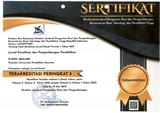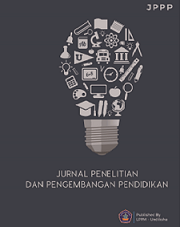Pemenuhan Kebutuhan Psikologis Dasar sebagai Mediator antara Dukungan Dosen dan Academic Buoyancy
DOI:
https://doi.org/10.23887/jppp.v7i2.54970Keywords:
Academic Buoyancy, Dukungan Dosen, Hybrid Learning, Psikologis DasarAbstract
While adapting to the hybrid learning system, students often encounter various obstacles. It takes the ability to overcome it, or what is known as academic buoyancy. This study aims to analyze the role of essential psychological fulfillment as a mediator in the relationship between lecturer support and student academic buoyancy when carrying out hybrid learning. This type of research is quantitative research using an explanatory research approach. Data was collected through survey techniques carried out online using a Google form for two weeks. This study uses statistical analysis of mediation using the Heyes Process Macro. The results of the mediation analysis of 115 participants show that fulfillment of basic psychological needs partially mediates the relationship between lecturer support and academic buoyancy. Lecturer support is proven to have a direct influence on academic buoyancy. Partial mediation also shows that the fulfillment of basic psychological needs is also confirmed to play a psychological factor in explaining how lecturer support can affect academic buoyancy. Completion of these psychological needs will then affect the increase in academic buoyancy. It was concluded that the role of fulfilling basic psychological needs in bridging the relationship between lecturer support and academic buoyancy. Therefore, the implication of this research is the development of interventions with the target of manipulating support from lecturers to meet students' basic psychological needs.
References
Alexander, C., Wyatt-Smith, C., & Du Plessis, A. (2020). The role of motivations and perceptions on the retention of inservice teachers. Teaching and Teacher Education, 96, 103186. https://doi.org/10.1016/j.tate.2020.103186. DOI: https://doi.org/10.1016/j.tate.2020.103186
Andriani, A., Dewi, I., & Sagala, P. N. (2019). Development of blended learning media using the mentimeter application to improve mathematics creative thinking skills. Journal of Physics: Conference Series, 1188(1), 12112. https://doi.org/10.1088/1742-6596/1188/1/012112. DOI: https://doi.org/10.1088/1742-6596/1188/1/012112
Arief, K., & Ahyar, J. (2020). Pengaruh Physical Distancing dan Social DistancingTerhadap Kesehatan Dalam Pendekatan Linguistik. Jurnal Syntax Transformation, 1(4), 14–18. http://jurnal.globalhealthsciencegroup.com/index.php/JPPP/article/download/83/65%0Ahttp://www.embase.com/search/results?subaction=viewrecord&from=export&id=L603546864%5Cnhttp://dx.doi.org/10.1155/2015/420723%0Ahttp://link.springer.com/10.1007/978-3-319-76. DOI: https://doi.org/10.1155/2015/420723
Aydın, G., & Michou, A. (2019). Self-determined motivation and academic buoyancy as predictors of achievement in normative settings. British Journal of Educational Psychology, 90(4), 964–980. https://doi.org/10.1111/bjep.12338. DOI: https://doi.org/10.1111/bjep.12338
Azhari, D. S., & Alaren, A. (2017). Peran Dosen Dalam Mengembangkan Karakter Mahasiswa. Jurnal Pelangi, 9(2), 88–97. https://doi.org/10.22202/jp.2017.v9i2.1856. DOI: https://doi.org/10.22202/jp.2017.v9i2.1856
Basson, M. J., & Rothmann, S. (2017). Antecedents of basic psychological need satisfaction of pharmacy students: The role of peers, family, lecturers and workload. Research in Social and Administrative Pharmacy, 14(4), 372–381. https://doi.org/10.1016/j.sapharm.2017.04.015. DOI: https://doi.org/10.1016/j.sapharm.2017.04.015
Calp, Ş. (2020). I Belong To This World! a Teacher Practice for Developing Relatedness in the School Environment. European Journal of Education Studies, 7(1), 22–40. https://doi.org/10.5281/zenodo.3694140.
Collie, R. J., Ginns, P., Martin, A. J., & Papworth, B. (2017). Academic buoyancy mediates academic anxiety’s effects on learning strategies: an investigation of English- and Chinese-speaking Australian students. Educational Psychology, 37(8), 947–964. https://doi.org/10.1080/01443410.2017.1291910. DOI: https://doi.org/10.1080/01443410.2017.1291910
Datu, J. A. D., & Yuen, M. (2018). Predictors and Consequences of Academic Buoyancy: a Review of Literature with Implications for Educational Psychological Research and Practice. Contemporary School Psychology, 22(3), 207–212. https://doi.org/10.1007/s40688-018-0185-y. DOI: https://doi.org/10.1007/s40688-018-0185-y
Fauzan, & Arifin, F. (2017). Hybrid Learning sebagai Alternatif Model Pembelajaran Fauzan , Fatkhul Hybrid Learning sebagai Alternatif Model Pembelajaran. Seminar Nasional Profesionalisme Guru Di Era Digital, November 2017, 244–252.
Goldman, Z. W., Goodboy, A. K., & Weber, K. (2017). College Students’ Psychological Needs and Intrinsic Motivation to Learn: An Examination of Self-Determination Theory. Communication Quarterly, 65(2), 167–191. https://doi.org/10.1080/01463373.2016.1215338. DOI: https://doi.org/10.1080/01463373.2016.1215338
Hayes, A. F. (2018). Introduction to Mediation, Moderation, and Conditional Process Analysis. In the Guilford Press (Second Edi, Vol. 46, Issue 3). The Guilford Press.
Hirvonen, R., Putwain, D. W., Määttä, S., Ahonen, T., & Kiuru, N. (2020). The role of academic buoyancy and emotions in students’ learning‐related expectations and behaviours in primary school. British Journal of Educational Psychology, 90(4), 948–963. https://doi.org/10.1111/bjep.12336. DOI: https://doi.org/10.1111/bjep.12336
Jang, H., Kim, E. J., & Reeve, J. (2016). Why students become more engaged or more disengaged during the semester: A self-determination theory dual-process model. Learning and Instruction, 43, 27–38. https://doi.org/10.1016/j.learninstruc.2016.01.002. DOI: https://doi.org/10.1016/j.learninstruc.2016.01.002
Jia, Y., & Cheng, L. (2022). The Role of Academic Buoyancy and Social Support on English as a Foreign Language Learners’ Motivation in Higher Education. Frontiers in Psychology, 13(May). https://doi.org/10.3389/fpsyg.2022.892603. DOI: https://doi.org/10.3389/fpsyg.2022.892603
Li, S., Xu, Q., Xie, J., Wang, L., Li, H., Ma, L., & Xia, R. (2022). Associations of parenting daily hassles with parents’ mental health during the COVID-19 school closure. Social Science & Medicine, 311, 115301. https://doi.org/10.1016/j.socscimed.2022.115301. DOI: https://doi.org/10.1016/j.socscimed.2022.115301
Lubis, H., Ramadhani, A., & Rasyid, M. (2021). Stres Akademik Mahasiswa dalam Melaksanakan Kuliah Daring Selama Masa Pandemi Covid 19. Psikostudia : Jurnal Psikologi, 10(1), 31. https://doi.org/10.30872/psikostudia.v10i1.5454. DOI: https://doi.org/10.30872/psikostudia.v10i1.5454
Martin, A. J., Yu, K., Ginns, P., & Papworth, B. (2016). Young people’s academic buoyancy and adaptability: a cross-cultural comparison of China with North America and the United Kingdom. Educational Psychology, 37(8), 930–946. https://doi.org/10.1080/01443410.2016.1202904. DOI: https://doi.org/10.1080/01443410.2016.1202904
Müller, C., & Mildenberger, T. (2021). Facilitating Flexible Learning by Replacing Classroom Time With an Online Learning Environment: A Systematic Review of Blended Learning in Higher Education. Educational Research Review, 34, 100394. https://doi.org/10.1016/j.edurev.2021.100394. DOI: https://doi.org/10.1016/j.edurev.2021.100394
Noviana, E., Psikologi, J., & Pendidikan, F. I. (2022). Hubungan Antara Self Efficacy Dengan Stres Akademik Pada Mahasiswa Yang Menjalani Perkuliahan Hybrid Saat Pandemi Covid-19. Character: Jurnal Penelitian Psikologi, 9(6), 199–208.
Núñez, J. L., & León, J. (2015). Autonomy support in the classroom: A review from self-determination theory. European Psychologist, 20(4), 275–283. https://doi.org/10.1027/1016-9040/a000234. DOI: https://doi.org/10.1027/1016-9040/a000234
Perera, K. D. R. L. J. (2022). Application of SDT to Promote Students Motivation and Engagement in Learning: Non-Asian and Asian Contexts. Asian Review of Social Sciences, 11(1), 17–21. https://doi.org/10.51983/arss-2022.11.1.2935. DOI: https://doi.org/10.51983/arss-2022.11.1.2935
Pitzer, J., & Skinner, E. (2016). Predictors of changes in students’ motivational resilience over the school year: The roles of teacher support, self-appraisals, and emotional reactivity. International Journal of Behavioral Development, 41(1), 15–29. https://doi.org/10.1177/0165025416642051. DOI: https://doi.org/10.1177/0165025416642051
Putwain, D. W, Gallard, D., & Beaumont, J. (2020). Academic buoyancy protects achievement against minor academic adversities. Learning and Individual Differences, 83, 101936. https://doi.org/10.1016/j.lindif.2020.101936.
Putwain, David W., Gallard, D., & Beaumont, J. (2020). Academic buoyancy protects achievement against minor academic adversities. Learning and Individual Differences, 83–84(February), 101936. https://doi.org/10.1016/j.lindif.2020.101936. DOI: https://doi.org/10.1016/j.lindif.2020.101936
Rahayu, R., Iskandar, S., & Abidin, Y. (2022). Inovasi Pembelajaran Abad 21 Dan Penerapannya Di Indonesia. Jurnal Basicedu, 6(2), 2099–2104. https://doi.org/10.31004/basicedu.v6i2.2082. DOI: https://doi.org/10.31004/basicedu.v6i2.2082
Rohinsa Sitompul, M. (2021). Reliabilitas dan Validitas Konstruk Academic Buoyancy di Indonesia. Humanitas, 5(3), 389–397.
Ruzek, E. A., Hafen, C. A., Allen, J. P., Gregory, A., Mikami, A. Y., & Pianta, R. C. (2016). How teacher emotional support motivates students: The mediating roles of perceived peer relatedness, autonomy support, and competence. Learning and Instruction, 42, 95–103. https://doi.org/10.1016/j.learninstruc.2016.01.004. DOI: https://doi.org/10.1016/j.learninstruc.2016.01.004
Ryan, R. M., & Deci, E. L. (2017a). Self-Determination Theory: Basic Psychological Needs in Motivation, Development, and Wellness. In Self-Determination Theory: Basic Psychological Needs in Motivation, Development, and Wellness. The Guilford Press. https://doi.org/10.1521/978.14625/28806.
Ryan, R. M., & Deci, E. L. (2017b). Self_Determination Theory. An Introduction and Overview. In Self-Determination Theory: Basic Psychological Needs in Motivation, Development, and Wellness (pp. 1–25). https://doi.org/10.7202/1041847ar. DOI: https://doi.org/10.1521/978.14625/28806
Schweder, S., & Raufelder, D. (2021). Needs satisfaction and motivation among adolescent boys and girls during self-directed learning intervention. Journal of Adolescence, 88, 1–13. https://doi.org/10.1016/j.adolescence.2021.01.007. DOI: https://doi.org/10.1016/j.adolescence.2021.01.007
Tarbetsky, A. L., Martin, A. J., & Collie, R. J. (2017). Social and emotional learning, social and emotional competence, and students’ academic outcomes: The roles of psychological need satisfaction, adaptability, and buoyancy. In Social and emotional learning in Australia and the Asia-Pacific: Perspectives, programs and approaches. (pp. 17–37). Springer Science + Business Media. https://doi.org/10.1007/978-981-10-3394-0_2. DOI: https://doi.org/10.1007/978-981-10-3394-0_2
Vansteenkiste, M., Ryan, R. M., & Soenens, B. (2020). Basic psychological need theory: Advancements, critical themes, and future directions. In Motivation and Emotion (Vol. 44, Issue 1). Springer US. https://doi.org/10.1007/s11031-019-09818-1. DOI: https://doi.org/10.1007/s11031-019-09818-1
Wang, C., Cho, H. J., Wiles, B., Moss, J. D., Bonem, E. M., Li, Q., Lu, Y., & Levesque-Bristol, C. (2022). Competence and autonomous motivation as motivational predictors of college students’ mathematics achievement: from the perspective of self-determination theory. International Journal of STEM Education, 9(1). https://doi.org/10.1186/s40594-022-00359-7. DOI: https://doi.org/10.1186/s40594-022-00359-7
Wang, C. K. J., Liu, W. C., Kee, Y. H., & Chian, L. K. (2019). Competence, autonomy, and relatedness in the classroom: understanding students’ motivational processes using the self-determination theory. Heliyon, 5(7), e01983. https://doi.org/10.1016/j.heliyon.2019.e01983. DOI: https://doi.org/10.1016/j.heliyon.2019.e01983
Yun, S., Hiver, P., & Al-Hoorie, A. H. (2018). Academic Buoyancy: Exploring Learners’ Everyday Resilience in the Language Classroom. Studies in Second Language Acquisition, 40(4), 805–830. https://doi.org/10.1017/S0272263118000037. DOI: https://doi.org/10.1017/S0272263118000037
Downloads
Published
How to Cite
Issue
Section
License
Copyright (c) 2023 Meilani Rohinsa

This work is licensed under a Creative Commons Attribution-ShareAlike 4.0 International License.
Authors who publish with the Jurnal Penelitian dan Pengembangan Pendidikan agree to the following terms:
- Authors retain copyright and grant the journal the right of first publication with the work simultaneously licensed under a Creative Commons Attribution License (CC BY-SA 4.0) that allows others to share the work with an acknowledgment of the work's authorship and initial publication in this journal.
- Authors are able to enter into separate, additional contractual arrangements for the non-exclusive distribution of the journal's published version of the work (e.g., post it to an institutional repository or publish it in a book), with an acknowledgment of its initial publication in this journal.
- Authors are permitted and encouraged to post their work online (e.g., in institutional repositories or on their website) prior to and during the submission process, as it can lead to productive exchanges, as well as earlier and greater citation of published work. (See The Effect of Open Access)







